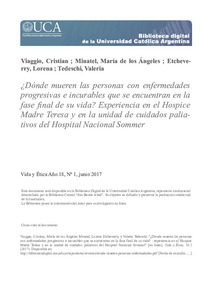Por favor, use este identificador para citar o enlazar este ítem:
https://repositorio.uca.edu.ar/handle/123456789/1412| Título: | Dónde mueren las personas con enfermedades progresivas e incurables que se encuentran en la fase final de su vida? : experiencia en el Hospice Madre Teresa y en la unidad de cuidados paliativos del Hospital Nacional Sommer | Autor: | Viaggio, Cristian Minatel, María de los Ángeles Etcheverry, Lorena Patricia Tedeschi, Valeria |
Palabras clave: | ENFERMOS TERMINALES; SISTEMAS DE SALUD; DIGNIDAD HUMANA; MOVIMIENTO HOSPICE; ACOMPAÑAMIENTO ESPIRITUAL; HOSPITALES; BIOETICA; CUIDADOS PALIATIVOS | Fecha de publicación: | 2017 | Editorial: | EDUCA | Cita: | Viaggio, Cristian, María de los Ángeles Minatel, Lorena Etcheverry, y Valeria Tedeschi. “¿Dónde mueren las personas con enfermedades progresivas e incurables que se encuentran en la fase final de su vida? : experiencia en el Hospice Madre Teresa y en la unidad de cuidados paliativos del Hospital Nacional Sommer” [en línea]. Vida y Ética, 18.1 (2017). Disponible en: https://repositorio.uca.edu.ar/handle/123456789/1412 | Resumen: | Resumen: La mayoría de las personas con enfermedades terminales transcurren sus últimos días en los hospitales con alto impacto de sufrimiento y con sus necesidades físicas, psicológicas, sociales y espirituales poco satisfechas. La institucionalización y la medicalización excesiva en la fase final de la vida no logran aliviar el sufrimiento de los enfermos y la mayoría de las veces los priva de un cuidado humanístico adecuado. Los Hospices son un complemento en el sistema de salud que permiten abordar de forma profesional y solidaria esta problemática ayudando a los enfermos en situación de final de vida a vivir dignamente hasta su fin natural. Las Unidades de Cuidados Paliativos en los hospitales públicos han sido una iniciativa muy importante del sistema de salud. La mayoría de las personas con enfermedades terminales fallecen internados en los hospitales y una minoría en sus hogares sin un adecuado alivio del sufrimiento. El sufrimiento debe ser aliviado –derecho al alivio del dolor– para que las personas enfermas al final de su vida puedan fallecer en plena dignidad. Abstract: Most people with terminal illnesses spend their last days in hospitals with a high impact of suffering and with their unmet physical, psychological, social and spiritual needs. Institutionalization and excessive medicalization in the final stages of life fail to alleviate the suffering of the sick, and most of the time deprive them of humanistic care appropriate. The Hospices are a complement in the health system that allow to approach in a professional and solidary way this problem helping the patients in situation of end of life to live with dignity until its natural end. Palliative care units in public hospitals have been a very important initiative of the health system. Most people with terminal illnesses die hospitalized in hospitals and a minority in their homes without adequate relief from suffering. Suffering must be alleviated - right to the relief of pain - so that sick people at the end of their lives can die in full dignity. |
URI: | https://repositorio.uca.edu.ar/handle/123456789/1412 | ISSN: | 1515-6850 | Disciplina: | BIOETICA | Derechos: | Acceso Abierto | Fuente: | Vida y ética, 18(1), 2017 ISSN 1515-6850 |
| Aparece en las colecciones: | VE - 2017 Año 18 nro. 1 |
Ficheros en este ítem:
| Fichero | Descripción | Tamaño | Formato | |
|---|---|---|---|---|
| donde-mueren-personas-enfermedades.pdf | 296,91 kB | Adobe PDF |  Visualizar/Abrir |
Visualizaciones de página(s)
426
comprobado en 27-abr-2024
Descarga(s)
214
comprobado en 27-abr-2024
Google ScholarTM
Ver en Google Scholar
Este ítem está sujeto a una Licencia Creative Commons

